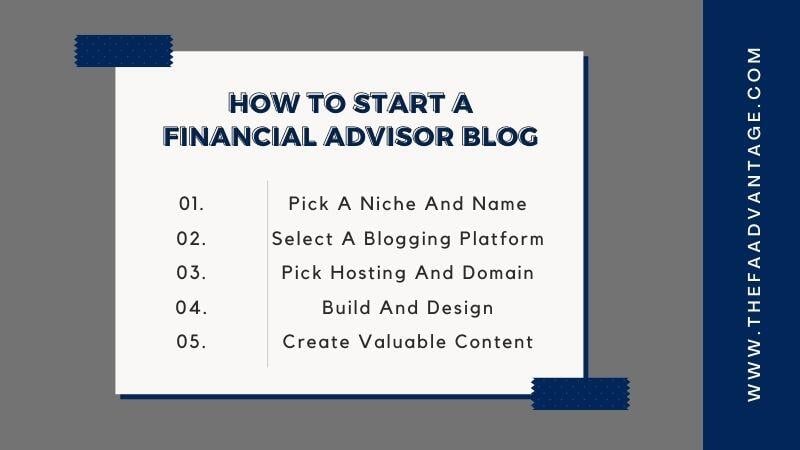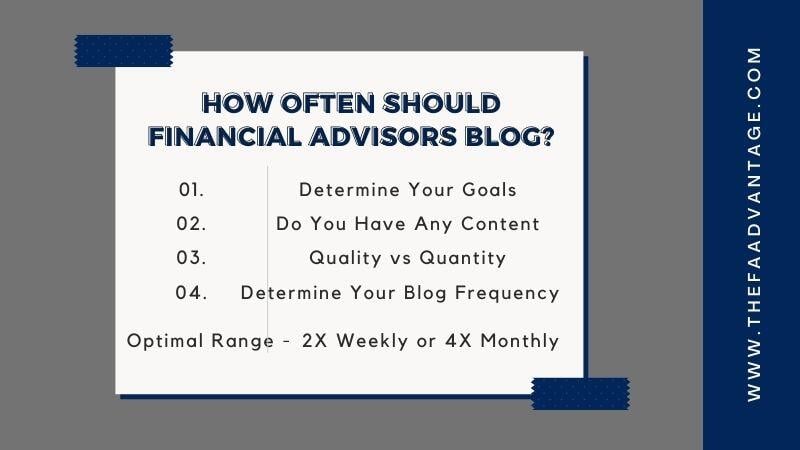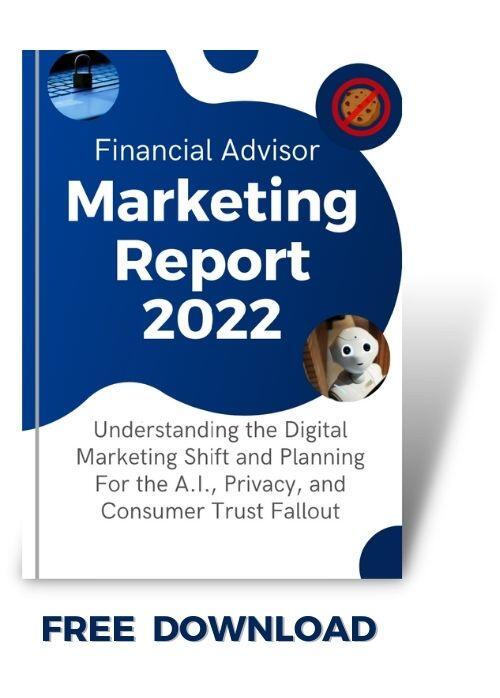The first step in creating an amazing financial advisor blog is knowing where to start.
Blogs are one of the most cost-effective methods to establish yourself as an industry expert and turn interest into leads. You’ll have many chances to connect with prospective customers via your content, all without paying a cent.
Blogs are a great way to reach out to potential clients and attract leads on autopilot.
Blogging is a long-term task that may seem like a fruitless job at first for many financial advisors.
It is an art that has to be developed. Blogging is not a trade where you get to see results instantly, it is a seed you have to plant, water, and weed consistently to get the most for your efforts.
Is blogging for financial advisors lucrative? Yes, it is. The content you create has the power to reach out to places where your reach might not extend and provide you with new clients. That obviously means your career takes a step forward and you make more money.
Now that you know some benefits of starting your own financial advisor blog, let’s get started on how you can start yours.

How do I start a financial advisor blog?
The financial advisor industry is one that has experienced significant growth in the past years. The industry is currently estimated to be worth $1.35trillion.
Also, with more businesses and individuals enlightened about why they need the help of financial advisors daily, we expect the market to experience more growth in the coming years.
Financial planning or wealth management blogs provide content that people find valuable which will help you build your brand and become better known in the market as well.
Resulting in you building a book of business you can be proud of.
To make this journey easier and less intimidating, we have selected “5 quick ways to get started”.
Picking a niche and a name.
Your blog’s niche is the particular market (topic) you will be targeting.
The financial planning industry is broad It includes services like wealth management, financial planning, portfolio management, brokerage services, and protection planning.
Therefore, you shouldn’t claim to be a jack of all trades when putting out content.
For your audience, it is more profitable to see you as being an authority in your field on a specific topic.
So, the first thing to do when starting your blog is to pick a niche to focus on.
This way, you get to gain popularity in the industry and grow your client base by being known as the go-to financial planner who can create successful strategies for your investors.
After you have decided on the best niche for your financial advisor type, it is time to name your new blog.
Your blogs name is a part of your brand; it is that simple. Imagine how you see an image and immediately your brain links it up to a name that has been registered.
In summary, the name is an impression that you leave in the brain of your audience that makes it easier for them to navigate back to you at all times.
Ultimately, branding yourself using your name will be ideal.
Your potential clients will look you up and having your online profiles in your name will help you get found online this way as well.
Your Google resume is important.
So, using your name will provide consistency and improve the chances of websites, blog posts, social, news mentions, podcasts, and industry publications are shown.
Selecting a blogging platform.
The next step is to find the best-suited blogging site to start building your own blog.
There is a wide selection of platforms. I suggest using self-hosted WordPress blog software if you are serious about blogging.
I advise using WordPress because it is easy to use and manage. With WordPress, you have control over every aspect of your site.
Also, you have access to thousands of free plugins which will help in your site’s creation.
Another major edge the WordPress software offers is the ability to interlink with google analytics which helps you monitor stats and grow your blog better.
Another great blogging platform you can check out is Medium.
Each blogging platform offers its pros and cons so, it is important to do research and select a blogging platform that best suits your needs.
Choosing hosting and a domain.
A web hosting company acts as the foundation for blogs and makes it available online 24/7.
I recommend Bluehost as the best beginner option for hosting and securing a domain name.
The top reason why I recommended Bluehost for hosting and domain choice for beginners is its past reviews.
The number of customers that have added to their base in a short time means they are doing things right.
Apart from this, the platform has an amazing customer support system; they reply really fast.
Having someone to guide new and intermediate bloggers at all times is a feature that is beneficial for non-techies.
Building and designing.
These days, you don’t have to be a professional web designer or developer to make your blog look beautiful!
Once you install WordPress software, you can choose pre-designed themes based on your preferences. For this reason, I advised you to work with WordPress.
Now, when building and designing your blog, you have 3 seconds to catch the attention of your audience.
So, will you prefer your audience to look at how beautifully you have designed your blog or you will help them find answers to their questions.
Your audience is looking for advice on better take control of their financial future, through quality writing over your design.
Therefore, it is important to focus majorly on keeping your website simple and easy to navigate for the audience.
A simple website with good financial advice will do better for lead generation than a fancy and cluttered one.
Creating useful and unique content.
Now, you can start writing and showcasing your knowledge through the articles published.
When you work on your articles, keep in mind that it’s all about making useful content that your readers will love and want to come back for.
However, for your content to be useful and unique, you need to understand what your audience wants.
No matter how great or well-written your content is, if it doesn’t help your investors feel they can make better independent financial decisions then, it will not do as well turning the reader into a lead.
To give you a head-start on how to brainstorm relevant financial topics, I have added a section below for “15 topic ideas” I’d recommend for a certified financial planner.
The selected topics cut across a wide range of financial planning services, which include the stock market, money-making decisions, investing, retirement planning, and portfolio/ wealth management.

How often should financial advisors blog?
As I have stated that consistency is the key to building a financial planning, wealth management, or any financial advisor skill-related blog.
Therefore, many new personal finance blogs have a question of “how often should I put out content?”
How often financial advisors should blog will depend on 4 main factors you should consider. These will guide you on how often you should blog.
Determine your content marketing goals.
If your goal is to rank on Google and drive readers to your content, then you have to focus on creating SEO-optimized content at a rate of 2-4x a week.
If you want an additional source of providing value but can bring traffic through other means, then once or twice a month can work.
The online content industry is getting more competitive than in the previous years so there is a need to sharpen your tools and skills.
One of the trending tools every blogger should have is the ability to research trending keywords for each topic to create SEO-optimized content.
I like to refer to this stage as the “seeding stage.” Regard this stage as you planning on what to plant and why you plant that seed.
This question will help you align your short-term goals of starting a blog to your long-term objectives.
How many blog post do you have already?
There is a correlation between the number of posts you create and the amount of traffic that comes to your site.
If your blog is new, you want to create content more often. If you already have content on your site, you can post less often and focus on optimizing the post that you already have.
As a new blogger, it is important to put out as much relevant content as possible. The more the content, the higher the probability of building a strong community around what you have to share.
Also, more content means you are providing more solutions that your readers need to help their families and improve their life. I like to call this the “watering phase.”
After you are certain you have enough content for your audience, you can now start the “weeding process.” When you put out a lot of content, there is a high probability that some of your content is lacking enough relevancy.
Take a look through old content that is published and not performing well. Try to find new ways to optimize your posts for better results.
Quantity VS Quality.
This is something you have to consider. Sometimes the best-optimized post for ranking is not ideal for creating quality content that you feel will be really helpful to your audience.
Yes, quantity brings more traffic but quality can deliver more leads.
A lot of readers in recent times prefer to find answers to their questions in a little time with little scrolling.
Therefore, mastering the ability to give your audience what they are searching for quickly can position you as a top financial resource.
The best blogging frequency.
Know that the perfect frequency doesn’t exist. Some find great success posting weekly while some post twice a month.
For you to find your key frequency you have to just start posting. You may realize that you enjoy writing and post multiple times a week and that is your perfect frequency.
Maybe you realize you only want to post twice a month. That is your perfect frequency. After you find your perfect frequency, learn how you can increase your chances of success based on your frequency.
Forcing yourself to post when is not aligned with what works best for you is why so many fail at blogging.
15 Topic Ideas for your finance blog
I can’t stress the importance of selecting a niche enough. It is the foundation of all your future marketing strategies.
It saves you from a lot of stress on determining what to write about.
Also, another added advantage of having a specialized niche for financial advisors is an opportunity to grow and learn while working.
This further helps to prove your claim of being a top financial planner and will enable more business owners to trust you.
An example of how to use the topic ideas is below:
“Top 5 mistakes to avoid when you want to {your audience’s main desire}”
Now, simply add the desire of your niche that you discovered in your niche selection research.
“Top 5 mistakes to avoid when you want to retire early“
- Top 5 mistakes to avoid when you want to {your audience’s main desire}
- 7 creative ways to save more money to {one of your audience’s desires}
- How to vacation on a budget: Follow these tips if you are {name your core audience}
- How to manage your household on a budget even if {your audience’s main objection}
- Tips to stay budget conscious even if {insert one main objection}
- Apply these methods to improve your credit if {add your audience’s desire or objection}
- How to raise financially responsible children if {Insert desire or objection}
- The top five retirement secrets to know if you are worried {insert one of your audience’s fears}
- How to get better returns from your savings account if {insert your audience’s desire}
- Little known ways to save if {insert one of your audience’s major objections}
- Believing {insert one objection} will keep your credit score lower.
- Credit card debt is your financial worst enemy if {insert one of your audience’s desires}
- Master the art of debt-free living if you want to {insert one of your audience’s desires}
- 3 things you should know about your retirement accounts if you want to {insert one of your audience’s desires}
- How to negotiate lower interest rates even if {insert one of your audience’s main objections}
If you find you are not certain of your audience’s Desires, Fears, and Objections you should start by finding out your Financial Advisor Type to learn the best ways of targeting your niche online.
Conclusion
When in wealth management you must focus a lot of your efforts on building trust and helping investors understand that their investment is in good hands.
Your blogs posts can go a long way in helping you with your marketing efforts beyond what you can do on LinkedIn, Facebook, and Twitter, especially for independent financial advisors, if you are willing to put in the work.
Attracting Better Leads Online
Our 2022 Marketing Report is 100% Free! Learn what it takes to be successful online with all the digital changes happening right now!
(No Email Or Anything Required)






